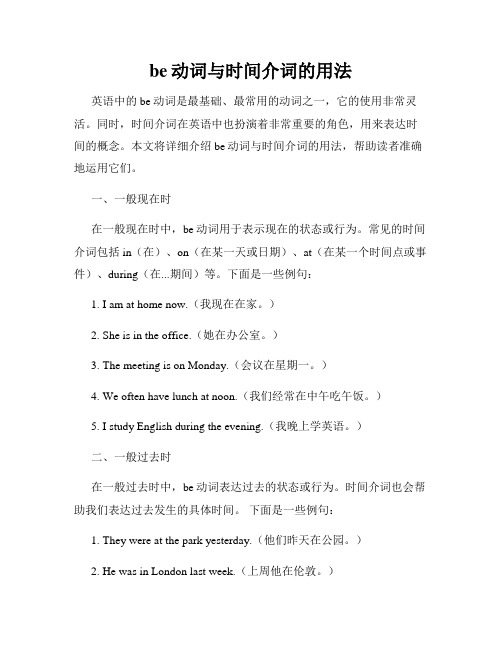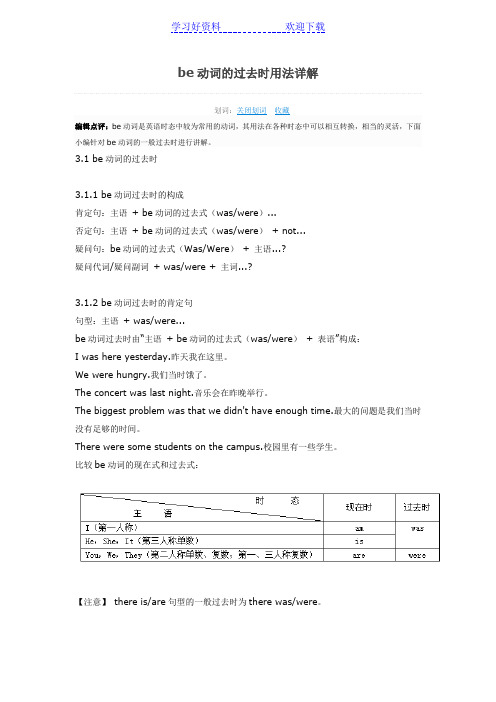be动词的一般过去式
BE动词的一般过去时

划线提问
• 1.The sofa was under the window. • Where was the sofa?
C ( )1. My father______ ill yesterday. A. isn't B. aren't C. wasn't D. weren't
D ( )2. ______ your parents at home last week﹖ A. Is B. Was C. Are D. Were
小结
be动词的一般过去时的用法
am , is ——过去式 was 否定式 was not / wasn’t are 过去式 were 否定式 were not /weren’t
be动词的一般过去时的结构
1. 肯定句:主语+谓语动词的过去式+其他 2. 否定句:主语+was/were+ not+其他
be动词与时间介词的用法

be动词与时间介词的用法英语中的be动词是最基础、最常用的动词之一,它的使用非常灵活。
同时,时间介词在英语中也扮演着非常重要的角色,用来表达时间的概念。
本文将详细介绍be动词与时间介词的用法,帮助读者准确地运用它们。
一、一般现在时在一般现在时中,be动词用于表示现在的状态或行为。
常见的时间介词包括in(在)、on(在某一天或日期)、at(在某一个时间点或事件)、during(在...期间)等。
下面是一些例句:1. I am at home now.(我现在在家。
)2. She is in the office.(她在办公室。
)3. The meeting is on Monday.(会议在星期一。
)4. We often have lunch at noon.(我们经常在中午吃午饭。
)5. I study English during the evening.(我晚上学英语。
)二、一般过去时在一般过去时中,be动词表达过去的状态或行为。
时间介词也会帮助我们表达过去发生的具体时间。
下面是一些例句:1. They were at the park yesterday.(他们昨天在公园。
)2. He was in London last week.(上周他在伦敦。
)3. The concert was on Saturday evening.(音乐会是在周六晚上。
)4. She studied English during her college years.(她在大学期间学习英语。
)三、进行时进行时表示现在或过去某个时间正在进行的动作或状态。
be动词与时间介词的结合在进行时态中更为重要。
下面是一些例句:1. They are playing basketball in the park.(他们正在公园打篮球。
)2. I was studying at the library when you called.(你打电话时我正在图书馆学习。
Be动词变化形式全覆盖解读

Be动词变化形式全覆盖解读Be动词是英语中最常用的动词之一,它在句子中扮演着连接主语与补语的重要角色。
Be动词的变化形式包括人称、数和时态的变化。
在本文中,我们将全面解读Be动词的各种变化形式,以帮助读者更好地理解和运用。
一、一般现在时(Present Simple)一般现在时的Be动词变化形式如下:I amYou areHe/She/It isWe/You/They areBe动词在一般现在时中的主要功能是表示现在的状态或常态。
例如:1. I am a student.(我是一个学生。
)2. They are happy.(他们很快乐。
)二、一般过去时(Past Simple)一般过去时的Be动词变化形式如下:I wasYou wereHe/She/It wasWe/You/They wereBe动词在一般过去时中表示过去的状态或常态。
例如:1. She was tired yesterday.(昨天她很累。
)2. We were classmates in high school.(我们在高中是同班同学。
)三、一般将来时(Future Simple)一般将来时的Be动词变化形式如下:I will beYou will beHe/She/It will beWe/You/They will beBe动词在一般将来时中表示将来的状态或常态。
例如:1. They will be here tomorrow.(明天他们会在这里。
)2. I will be a doctor in the future.(将来我会成为一名医生。
)四、现在进行时(Present Continuous)现在进行时的Be动词变化形式如下:am/is/are + 现在分词Be动词在现在进行时中用来表示现在正在进行的动作。
例如:1. She is studying for her exams.(她正在为考试而学习。
)2. They are having dinner at the restaurant.(他们正在餐厅吃晚饭。
一般过去时的句子结构

一般过去时的句子结构1、be动词的一般过去时其句型:肯定式:主语+BE动词过去式(was、were)+其他 e.g.I was very happy last night.否定式:主语+BE动词过去式(was、were)+not+其他 e.g.Mike wasn’t at home yesterday. 疑问式:BE动词过去式(was、were)+主语+其他 e.g.Was he a driver three years ago?2、当谓语由实义动词充当(不区分第三人称单数):肯定式:主语+动词过去式+其它 e.g.I played the piano yesterday evening.否定式为:主语+did not+动词原形+其它 e.g.He didn’t go to the cinema last night.疑问式为:Did+主语+动词原形+其它 e.g.Did she teach you English yesterday?一般过去时的句子结构1、be动词的一般过去时其句型:肯定式:主语+BE动词过去式(was、were)+其他 e.g.I was very happy last night.否定式:主语+BE动词过去式(was、were)+not+其他 e.g.Mike wasn’t at home yesterday. 疑问式:BE动词过去式(was、were)+主语+其他 e.g.Was he a driver three years ago?2、当谓语由实义动词充当(不区分第三人称单数):肯定式:主语+动词过去式+其它 e.g.I played the piano yesterday evening.否定式为:主语+did not+动词原形+其它 e.g.He didn’t go to the cinema last night.疑问式为:Did+主语+动词原形+其它 e.g.Did she teach you English yesterday?一般过去时的句子结构1、be动词的一般过去时其句型:肯定式:主语+BE动词过去式(was、were)+其他 e.g.I was very happy last night.否定式:主语+BE动词过去式(was、were)+not+其他 e.g.Mike wasn’t at home yesterday. 疑问式:BE动词过去式(was、were)+主语+其他 e.g.Was he a driver three years ago?2、当谓语由实义动词充当(不区分第三人称单数):肯定式:主语+动词过去式+其它 e.g.I played the piano yesterday evening.否定式为:主语+did not+动词原形+其它 e.g.He didn’t go to the cinema last night.疑问式为:Did+主语+动词原形+其它 e.g.Did she teach you English yesterday?。
be动词的一般过去式

be 动词一般过去时特殊疑问句: 特殊疑问词+be 动词+主语+其他
Where were you yesterday? 你昨天晚上去哪了?
What was there in the cup then? 那时,杯子里有什么?
be 动词一般过去时一般疑问句: be动词(was/were)+ 主语+其他
Was he in the zoo? 他在动物园吗?
Were you in the playground just now? 你们刚刚在操场吗?
Were they at home last night? 他们昨天晚上在家吗?
be 动词一般过去时否定句: 主语+be动词(was/were)+not+其他
I was not at home last night. 我昨天晚上不在家。
He was not tall when he was young. 他小时候长的不高。
We were not in Shanghai last year. 我去式 was
was
were
be 动词一般过去时肯定句: 主语+be动词(was/were)+其他
She was very busy yesterday.她昨天很忙。 She was very sad last week.她上周很伤心。 He was at school lat Tuesday.他上周二在学校。 They were my friends.他们以前和我是朋友。
一般过去时表示过去某个时间存在的状态,
通常和ago, last, yesterday, the day before yesterday, just now, a moment ago或具体的过去日期、年代 连用。
be动词的过去时用法详解

be动词的过去时用法详解划词:关闭划词收藏编辑点评:be动词是英语时态中较为常用的动词,其用法在各种时态中可以相互转换,相当的灵活,下面小编针对be动词的一般过去时进行讲解。
3.1 be动词的过去时3.1.1 be动词过去时的构成肯定句:主语+ be动词的过去式(was/were)...否定句:主语+ be动词的过去式(was/were)+ not...疑问句:be动词的过去式(Was/Were)+ 主语...?疑问代词/疑问副词+ was/were + 主词...?3.1.2 be动词过去时的肯定句句型:主语+ was/were...be动词过去时由“主语+ be动词的过去式(was/were)+ 表语”构成:I was here yesterday.昨天我在这里。
We were hungry.我们当时饿了。
The concert was last night.音乐会在昨晚举行。
The biggest problem was that we didn't have enough time.最大的问题是我们当时没有足够的时间。
There were some students on the campus.校园里有一些学生。
比较be动词的现在式和过去式:【注意】there is/are句型的一般过去时为there was/were。
3.1.3 be动词过去时的否定句句型:主语+ was/were + not...be动词过去时的否定句结构是在be动词过去式was/were后面加上not。
否定式的was not,were not大多使用缩写形式wasn't(读作/′w znt/)和weren't(读作/w nt/):I was not here yesterday.昨天我不在这里。
He wasn't busy the other day.前几天他不忙。
There weren't any students in the classroom.教室里一个学生也没有。
(精品)BE动词的一般过去时
A. Was; before
B. Is; before
C. Was; after
D. Is; after
( )5. —Who was on duty last Friday﹖
—___B___.
A. I am
B. I was
C. Yes, I was
D. No, I wasn't
一、用be动词的适当形式填空 1. I ___w_as___ at school yesterday. 2. He ___w_a_s___ at the camp last week. 3. We ___w_e_re___ students two years ago. 4. They ___w_e_re___ on the farm a moment ago. 5. Yang Ling ___w_as____ eleven years old last year. 6. There ___w_a_s___ an apple on the plate yesterday. 7. There ___w__as___ some milk in the fridge on Sunday. 8. The mobile phone ___w_a_s__ on the sofa yesterday evening.
2. All the students were very excited. 否定句: _A_l_l t_h_e_s_tu_d_e_nt_s_w_e_re_n_o_t_v_er_y_e_xc_i_te_d_. ______________________ 一般疑问句: _W__er_e_a_ll_th_e_s_t_ud_e_n_ts_v_e_ry_e_x_c_it_ed_?_____________________ 肯、否定回答: _Y_e_s_, t_h_e_y _w_er_e_. ___________N_o,_t_he_y_w_e_r_e_n_ot_. _________
be动词的时态变化
be动词的时态变化英语中的be动词(be verb)是非常常见的一个词汇,用来表示存在、状态、身份等。
而be动词除了在不同的人称和单复数形态下有变化外,还有多种时态的变化,包括现在时、过去时、将来时等。
本文将详细介绍be动词在不同时态下的变化规则。
一、现在时态(Present Tense)现在时态表示现在正在进行的动作、状态或者常态。
be动词在现在时态下的变化规则如下:1. 一般现在时(Simple Present)一般现在时用来表示经常发生的事情、客观真理、常态等。
be动词在一般现在时下的变化规则如下:I amYou areHe/She/It isWe/You/They are例如:- I am a student.- You are tall.- He is happy.2. 现在进行时(Present Continuous)现在进行时用来表示现在正在进行的动作。
be动词在现在进行时下的变化规则如下:I am beingYou are beingHe/She/It is beingWe/You/They are being例如:- I am studying.- You are watching TV.- He is writing a letter.3. 现在完成时(Present Perfect)现在完成时用来表示过去发生的动作对现在的影响。
be动词在现在完成时下的变化规则如下:I have beenYou have beenHe/She/It has beenWe/You/They have been例如:- I have been to France.- You have been busy.- He has been sick.二、过去时态(Past Tense)过去时态表示过去发生的动作或者存在的状态。
be动词在过去时态下的变化规则如下:1. 一般过去时(Simple Past)一般过去时用来表示过去发生的动作或存在的状态。
小学be一般过去时练习题及答案
小学be一般过去时练习题及答案小学be一般过去时练习题及答案在学习英语的过程中,动词的时态是一个非常重要的部分。
其中,be动词的一般过去时是初学者常常会遇到的难题之一。
为了帮助小学生更好地掌握be动词的一般过去时,以下是一些练习题及答案供参考。
练习题一:根据括号内的提示,将下列句子改写成一般过去时。
1. I am happy. (She)2. They are at home. (We)3. He is a doctor. (She)4. We are in the park. (They)5. She is my friend. (He)答案一:1. She was happy.2. We were at home.3. She was a doctor.4. They were in the park.5. He was my friend.练习题二:根据括号内的提示,将下列句子改写成一般过去时。
1. I am not tired. (He)2. They are not here. (We)3. She is not hungry. (I)4. We are not late. (They)5. He is not happy. (She)答案二:1. He was not tired.2. We were not here.3. I was not hungry.4. They were not late.5. She was not happy.练习题三:根据括号内的提示,将下列句子改写成一般过去时。
1. Are you a student? (She)2. Are they at school? (We)3. Is he your brother? (She)4. Are we in the classroom? (They)5. Is she a teacher? (He)答案三:1. Was she a student?2. Were we at school?3. Was she his brother?4. Were they in the classroom?5. Was he a teacher?练习题四:根据括号内的提示,将下列句子改写成一般过去时。
be动词的一般过去时及练习题
be动词的一般过去时及练习题Be动词是英语中最基础的动词之一,它用于表达人或事物的状态、举止、性质等。
而在过去时态中,be动词的形式发生了变化,让我们一起来学习一下be动词的一般过去时,以及一些相关的练习题。
一、Be动词的一般过去时形式在一般现在时态中,be动词的形式有三种:am(用于第一人称单数),is(用于第三人称单数)和are(用于第二人称、第一人称复数和第三人称复数)。
而在一般过去时态中,be动词的形式发生了变化,具体如下:1. 第一人称单数:I was2. 第三人称单数:He/She/It was3. 第二人称单数和复数:You were4. 第一人称复数和第三人称复数:We/They were二、使用be动词的一般过去时1. 描述过去的状态或性质例句:- She was tired after a long day at work.- They were happy to see each other again.2. 表示过去的行为或位置- I was playing basketball with my friends yesterday.- The cat was sitting on the chair all day.3. 表达过去的偏好或观点例句:- He was always a fan of rock music.- We were against the idea from the beginning.三、练习题现在,让我们进行一些练习题来巩固一下所学的知识。
请根据句子的意思,用be动词的一般过去时填空。
1. The students ________ excited about the upcoming field trip.2. Last night, it ________ raining heavily.3. My parents ________ worried when they couldn't reach me.4. We ________ at the movies when she called.5. ________ you at home when he arrived?6. She ________ a great actress in her prime.7. They ________ not ready for the presentation yesterday.8. It ________ a beautiful day at the beach.参考答案:2. was3. were4. were5. Were6. was7. were8. was四、总结通过学习本文,我们了解了be动词的一般过去时的形式和用法。
- 1、下载文档前请自行甄别文档内容的完整性,平台不提供额外的编辑、内容补充、找答案等附加服务。
- 2、"仅部分预览"的文档,不可在线预览部分如存在完整性等问题,可反馈申请退款(可完整预览的文档不适用该条件!)。
- 3、如文档侵犯您的权益,请联系客服反馈,我们会尽快为您处理(人工客服工作时间:9:00-18:30)。
be 动词一般过去时否定句: 主语+be动词(was/were)+not+其他 I was not at home last night.
我昨天晚上不在家。
He was not tall when he was young.
他小时候长的不高。
We were not in Shanghai last year.
过去式
am
was
is
was
are
were
be 动词一般过去时肯定句:
主语+be动词(was/were)+其他
She was very busy yesterday.她昨天很忙。 She was very sad last week.她上周很伤心。 He was at school lat Tuesday.他上周二在学校。 They were my friends.他们以前和我是朋友。
一般过去时表示过去某个时间存在的状态, 通常和ago, last, yesterday, the day before yesterday, just now, a moment ago或具体的过去日期、年代 连用。
要表达过去的事,就要用到动词的过去式, be 动词的过去式形式为was/were: 原形
我们去年不在上海。
be 动词一般过去时一般疑问句: be动词(was/were)+ 主语+其他 Was he in the zoo? 他在动物园吗? Were you in the playground just now?
你们刚刚在操场吗?
Were they at home last night?
他们昨天晚上在家吗?
be 动词一般过去时特殊疑问句:
特殊疑问词+be 动词+主语+其他
Where were you yesterday?
你昨天晚上去哪了? What was there in the cup then? 那时,杯子里有什么?
